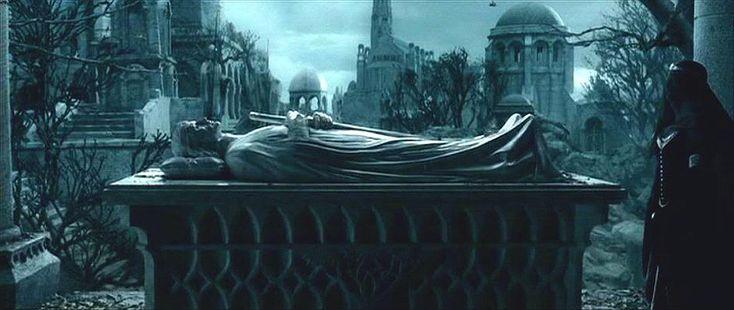-
Posts
6,809 -
Joined
-
Days Won
31
Posts posted by Nick1Ø66
-
-
No Palicki? Well damn. She’s…fantastic.
But I’ll take more Orville no matter what. Make it so, Seth.
- leeallen01 and Yavar Moradi
-
 2
2
-
On 21/4/2024 at 12:56 AM, A24 said:
Let's hope his last movie won't be another Western, because let's face it, that's not his forte. Heck, even a Tarantino Bond movie would be better than a Western.
After Basterds, Hateful Eight is my favourite Tarantino. Though I was disappointed with Django.
-
Absolutely phenomenal film, and my personal Nolan favourite (even if the denouement falls into a bit of Spielbergian sentimentality). Highly recommended in IMAX.
-
-
-
- Popular Post
- Popular Post
4 minutes ago, Brónach said:Kate Capshaw is unbelievable
That's what Spielberg said.
- Edmilson, Mr. Hooper, Brando and 1 other
-
 4
4
-
- Popular Post
- Popular Post
6 hours ago, Mr. Hooper said:
Agreed. But some seem to bristle at any depiction of a culture that doesn't present it 100% accurately or in the best possible light. And poking any fun at them is, certainly, a big no-no today.Personally, I don't look to movies for an accurate depiction of anything—or to teach me about anything. License is taken all the time to augment their effect—be it dramatic, comedic, or whatever.
For the record, as a kid I didn't come away from TOD thinking that Indians ate "eyeball soup," "Snake Surprise," or "chilled monkey brains" as part of their diet... It was an obviously broad attempt at humour.
But whether or not you find it "funny" is of course a matter of personal opinion.
Indeed. I know certainly there are Indians who may not have appreciated the portrayal (notably the Indian government at the time), and, well, fair enough. But frankly, most of the people I've seen take great offence at this film haven't been Indians, but rather the usual sort who are eager to take offence on behalf of someone else.
I think it's just as silly to expect that Indiana Jones and the Temple of Doom be a complete, and accurate portrayal of Indians as it is to expect The Godfather to be a complete and accurate portrayal of Italians. I grew up watching wuxia films but I never thought every Chinese person was a martial arts expert who spent their days fighting.
The great Amrish Puri (Mola Ram), put it best...
"It's based on an ancient cult that existed in India and was recreated like a fantasy. If you recall those imaginary places like Pankot Palace, starting with Shanghai, where the plane breaks down and the passengers use a raft to jump over it, slide down a hill and reach India, can this ever happen? But fantasies are fantasies, like our Panchatantra and folklore. I know we are sensitive about our cultural identity, but we do this to ourselves in our own films. It's only when some foreign directors do it that we start cribbing."
-
-
- Popular Post
- Popular Post
Temple of Doom has really grown on me. I've come to appreciate it more over the years, and judge it on its own terms rather than as a sequel to Raiders. The opening musical number, and the entire opening scene in fact leading up to the plane escape in particular, is fantastic. It's certainly not in the same league as Raiders, and while I personally prefer Crusade, I'll give TOD points for originality and taking a risk. It's also one of those instances where a reappraisal makes the film look better in comparison to more recent entries in the series.
I've also come to like Willie Scott more, and now actually find her less annoying than Marion.
As to whatever sensitivities people may have developed regarding this fun flick over the years, to paraphrase the brilliant Stephen Fry, "You're offended? Well so f*cking what"?
- Cindylover1969, Andy, Groovygoth666 and 1 other
-
 4
4
-
Hmmmm. This is the type of UFO story I can see later-day Spielberg telling...he's often spoken about how, when he made CE3K, that version of himself would have flown away on the Mothership, but later in life, as a husband and father, he said he wouldn't. So I always thought it would be interesting to see a film about Roy Neary returning to Earth after decades away with the CE3K aliens (i.e. ET). I mean, the guy had a wife and kids and essentially abandoned them, and it would be interesting to see how he, and they'd, react to his homecoming and how he'd adjust to life on a completely unrecognizable Earth. Dreyfuss is probably too old for the part, but you could recast for a younger Roy Neary (proving Einstein right).
-
-
-
8 hours ago, filmmusic said:
Phenomenal film.
Not only does Hollywood not make films like this any more, I've pretty much resigned myself that they never will again.
-
2 minutes ago, Chen G. said:
I feel like its much, much, MUCH more detrimental in Star Wars, and while the prequels do give some stuff back, I feel like in that case the scales are tipped way too far in the direction of detracting from the original film, as opposed to enriching it.
But even if that's true, there's still nothing to be gained, and certainly something to be lost, by watching The Hobbit first.
-
23 hours ago, Chen G. said:
Vader's entrance? Meh. Seen him plenty for that to maintain its drama.
The Droids wandering through the dunes? Meh, we've seen endless amounts of far-more-impressively-framed desert shots AND we know Tatooine so its no longer about the Droids venturing into the unknown.
The cantina? Pfft, we've seen more weird aliens than stars in the sky.
The Death Star blowing up Leia's home? Pfft, please! We've seen the Death Star blow up several planets by this point.
The lightsaber battle? Pfft, we've seen people - including Vader and Obi Wan - slash and jump and throw objects at each other, so these two geezers gently poking at each other? NEXT!
etc... You get my point.
I get your point indeed. Those scenes in the various prequels tend to rob the original scenes of much of their power, especially, I imagine for a first time viewer who foolishly chose to watch the films in in-universe "chronological" order.
Of course, the same can be said for The Hobbit trilogy, which has many callbacks to images and sequences to those done (better) in The Lord of the Rings. Seeing dark Gandalf say "I am not trying to rob you" isn't as powerful and shocking once you've seen the same bit done with the "If I say Bilbo Baggins is a burglar..." in the prequel.
Anyone who watches Star Wars or Middle-Earth for the first time in "sequence" is robbing themselves of something very special that they can never get back.
-
Sure. Kids make up their own mind on what they like. If the kid doesn't like Star Wars '77, not much to be done about it.
But just because a kid prefers McDonalds doesn't mean I'm not making them eat their vegetables.

- Mr. Hooper and Pellaeon
-
 2
2
-
-
- Popular Post
- Popular Post
40 minutes ago, Tallguy said:Of course all of this is done away with if you accept the simple truth that the first Star Wars movie that one should ever watch is Star Wars.
The simple truth is that, in every case, release order is the preferred order for watching a film series for the first time.
-
On 1/4/2024 at 10:17 PM, Naïve Old Fart said:
FYEO... the score is the most "out there" EON Bond score, ever, including GOLDENEYE.
TSWLM, Marvin Hamlisch & Bond ‘77 have entered the room. -
On 4/4/2024 at 10:15 AM, Schilkeman said:
I agree it’s open to interpretation, but artist intention and context is vital, otherwise a piece of art is forever beholden to the aesthetic whims of the current generation.
But that’s exactly right…every generation interprets art differently, viewed through their own lens and informed by their own values.
Look how differently productions of Shakespeare have varied over the years. There have been productions with different spins on race, class, sex, etc. Countless interpretations. For example, I’ve seen Othello probably a dozen times, and every production had its own take on the same text. Ditto for Hamlet. Henry V had been staged as a British Nationalist piece during WWII and anti-war during the Iraq War. Those varying interpretations are part of what makes art, well…art. It’s also art of what makes great art timeless.
I’ll also add that what an artist intends to do isn’t always what they end up creating. If people think art is telling them X, and the artist says “no, no, you’ve got it all wrong, I’m saying Y”, well, whose problem is that? Is it a failure of comprehension on the part of the viewer, or listener, or a failure of the artist in not fully conveying their intention?
Some see Verhoven’s Starship Troopers as promoting fascism. Others (including me) see it as satire. Verhoven will tell you it’s the latter, but so what?
I certainly agree that an artist’s intent with their own work is something that can inform an interpretation and opinion of it, but it’s only one component, and while important, it’s not a defining one. IMO this is a view most good artists share.
-
22 minutes ago, A24 said:
I would agree with this if we were talking about music but movies are generally not as ambiguous as music or abstract paintings.
To me it’s not a question of ambiguity. Of course some artists (usually the better ones) are more ambiguous in what they’re trying to say than others. But once art is in the world, it’s open to interpretation, no matter how clear, or ambiguous, the artist’s intentions.The fact that people have taken so many different messages from Barbie is a credit, in my judgment, to Gerwing as an artist, and it would be a lesser film, again IMO, if she was just trying to preach. Part of its power, like most great art, is that so many take different things from it…e.g Shakira had a different take on the film than some here have. Is her take “wrong”?
All this gives Barbie a universal appeal, and made it so successful, where so many “message” film’s fail.
-
4 hours ago, JNHFan2000 said:
Exactly... both Ken & Barbie go through great arcs and development in the film.
And I think the reaction that comes from her repsone is also kinda the point of the film and to me sounds like they didn't understand what the film was trying the say.
3 hours ago, Jay said:Edmilson certainly didn't
What a film is “trying to say” isn’t as important as what a person hears. Once art is released into the world, all that matters is how people interpret it.
I’m not sure about declaring what’s the right or wrong message from Barbie. It’s a Rorschach test. The director’s intentions are largely irrelevant. If Barbie’s not open to interpretation, then it’s just sermonising, and if it is, then people are free to interpret it as they wish.
- GerateWohl and HunterTech
-
 2
2
-
“What do you mean I’m funny? Funny how”?
-
All the MCU films are made this way. I mean, maybe there was a bit more freedom on the first few, but by and large they're all very tightly controlled, producer-driven films.
Not that there's necessarily anything wrong with that, it's worked very well for Marvel, and there wouldn't be the continuity they've had without it. There's a reason it's the only truly successful shard universe. They just used to be a lot better at it.
- Groovygoth666 and Edmilson
-
 2
2








The Cult Exploitation Trash B-Movie Thread
in General Discussion
Posted
@Andy, have you seen Hawk the Slayer? If not, given you’ve already worked your way through Sword & the Sorcerer & Deathstalker, it needs to be next on your list.
Dwarfs! Giants! Magic swords! And yes, that’s Jack Palance as Darth Vader.